State-of-the-art and world-class help describe the classrooms, teaching labs, offices, libraries, and student project space available within the College of Engineering and Physical Sciences. The recipient of four of the five major renovations of the Knowledge Economy Education Plan for New Hampshire (KEEP NH), CEPS is an exceptional resource for engineering businesses and industries statewide and more specifically for UNH’s aspiring engineers and scientists of tomorrow. (Totaling ~$130M)
Kingsbury Hall
Built in 1950 and renovated in 2007, the new Kingsbury Hall provides our students the environment they need to learn to become the next generation of scientists, engineers and mathematicians. Our laboratories now have the appropriate infrastructure, with high-bay areas, and appropriate heating, air conditioning and ventilation throughout. All departments in Kingsbury have computer clusters and appropriate student project spaces. Each classroom has internet access with LCD projectors including two state-of-the-art lecture halls to accommodate larger groups.
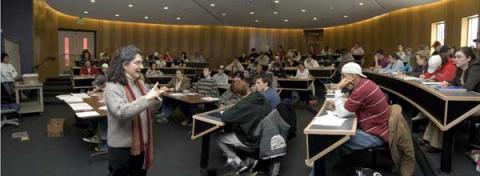
Walk through Kingsbury today and, by design, you can look into labs and see through large windows on both sides what students and faculty are discovering and creating. There are gathering places where students and faculty discuss and solve problems. Computer labs are large enough so that students can work at a terminal with important hardware next to it and easily interact with other students.
DeMerritt Hall
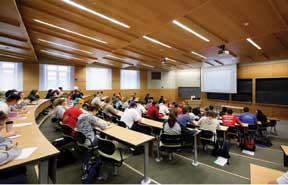
Originally constructed in 1913 with a renovation in 1966, and newly dedicated in 2008, this new facility provides state-of-the-art laboratories, classrooms, lecture halls, and offices of the Physics Department. DeMeritt Hall has light, and space, and air, and enough blackboards to write out the derivation of every physics equation, ever. There is room to think. Here is the new home of the pioneering studio math/physics class, with its focus on small group work and learning through multimedia.
Students are attached to the amazing student physics lounge, with floor-to-ceiling windows that provide a 180 degree view of the southwest campus. The space provides a large open opportunity for students to work on projects right after they spill out of class -- if they aren’t distracted by the view.
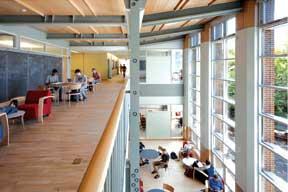
One of our undergraduate students wrote, "From my perspective as a student, our world reknown faculty and resources such as DeMeritt Hall provide exciting opportunities and are prime examples of a powerful and innovative future within Physics and beyond here at UNH. This is an institution that deeply respects the role scientific research plays in society."
James Hall
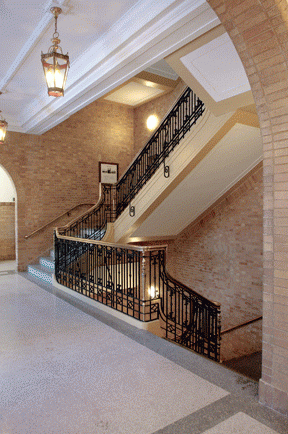
Dedicated in 1929 and renovated in 2010, James Hall boasts state-of-the-art classrooms and teaching labs, offices for 36 faculty and 75 graduate students. Instructional and research field activities are enhanced with a new field-science support suite for equipment storage and staging as well as a new instructional courtyard. Research labs have been fitted with some 20 high-performance fume hoods. Amongst all of the renovations and additions, we have preserved many of the familiar and historically important features of the old James Hall, including the “grand staircase” in the front entrance and Charles Hitchcock’s large wooden NH geological relief map from c. 1878 (refinished and moved to a new location).
In addition to the enormous benefits to our instructional and research programs, the newly renovated James Hall will be the first academic building in the USNH system to obtain LEED Certification for its environmentally responsible use of materials and its efficient energy and water systems. We are using the renovation as an opportunity to upgrade laboratory equipment as well.
Parsons Hall
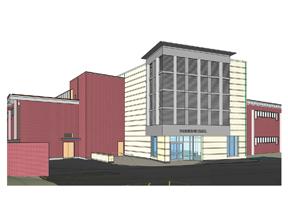
Constructed in 1965, Parsons' renovations are currently underway. The High-Speed Nanomanufacturing Center (National Science Foundation funded and part of a major NSF Center of Excellence) is located in Parsons Hall.
Parsons is the chemistry teaching and research facility at the University and provides the foundation courses for virtually all engineering, physical science, and life science majors.
Gregg Hall
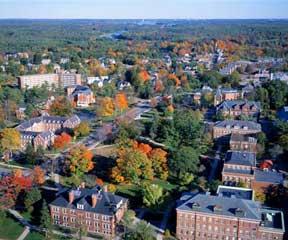
Dedicated in 1999, Gregg Hall is a state-of-the-art research and teaching facility that is home to the Department of Civil Engineering’s Environmental Research Group, NOAA Centers and the College of Life Sciences and Agriculture’s Hubbard Center for Genome Studies.
Gregg Hall, along with the Jere Chase Ocean Engineering Laboratory, anchors the university’s “West Campus.” Funded primarily through federal grants, with additional state awards and private gifts, Gregg Hall and its programs symbolize the university’s commitment to inquiry-based education and engagement through research and scholarship.
Morse Hall
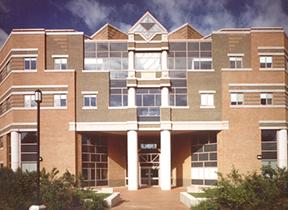
Morse Hall is the home to the University's renowned Institute for study of Earth, Oceans, and Space. The core of the building is an atrium with great acoustics, providing an informal concert venue. Mores Hall provides lab space for some of the world's greatest scientific and engineering minds.
Getting Here
Kingsbury Hall
33 Academic Way
Durham, NH 03824
United States